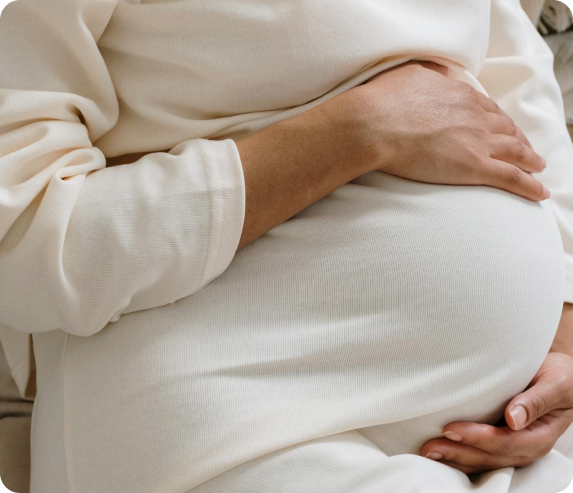

Surrogacy is where a surrogate mother carries and delivers a baby for intended parents (also called commissioning parents). It offers a pathway to parenthood for those unable to carry a pregnancy themselves due to medical or personal circumstances.
Surrogacy is typically recommended in the following situations:
Absolute Indications:
Relative Indications:

The surrogate carries an embryo created through IVF, using the eggs and sperm of the intended parents or donors. The surrogate has no biological connection to the child.
In traditional surrogacy, the surrogate is inseminated with sperm from the intended father, making her the biological mother. This type of surrogacy is not practiced.

Surrogacy laws in Australia differ from state to state. In NSW, intended parents must demonstrate a medical need for surrogacy, such as infertility or health issues that prevent them from carrying a pregnancy.
All arrangements must adhere to the Surrogacy Act, with the following key requirements:

The Surrogacy Act 2010 allows for a Parentage Order, which legally recognises the intended parents as the child's parents, instead of the birth mother and her partner.
Surrogates have the right to receive proper medical care and support, as well as fair compensation directly related to the pregnancy. They also have the right to make informed choices about their health and the pregnancy.
Intended parents are responsible for covering medical expenses and legal fees, as well as providing emotional support to the surrogate.
Both the intended parents and the surrogate undergo thorough medical consultations and counselling before beginning the surrogacy process.


The medical part of surrogacy usually starts with in vitro fertilisation (IVF). Eggs are retrieved from the intended mother or a donor, fertilised with sperm from the intended father or a donor, and the resulting embryo is transferred to the surrogate’s uterus.
The surrogate undergoes regular monitoring throughout the pregnancy to ensure the health and well-being of both herself and the baby.
After the baby is born, the intended parents need to apply for a Parentage Order through the Family Court of Australia. This order makes them the legal parents of the child, overriding the birth mother’s legal status.
Surrogacy can be expensive, so intended parents need to plan ahead. Costs often include medical expenses for IVF, legal fees for contracts and applications, and compensation for the surrogate’s expenses. There may also be costs for counselling and support services.
It’s important to note that Medicare funding is not available for surrogacy arrangements. Careful financial planning is essential to navigate these expenses.

If surrogacy is the right path for growing your family, I’m here to provide expert guidance and support throughout the journey.
With extensive experience in alternative fertility solutions, including surrogacy, I take a personalised approach to care. Together, we’ll ensure your journey is informed, supported, and tailored to your unique needs, helping you achieve your dream of parenthood.
Surrogacy is when a surrogate carries and delivers a baby for intended parents. There are two main types:
Yes, altruistic surrogacy is legal in Sydney and across Australia, meaning surrogates cannot receive financial compensation beyond reasonable medical and pregnancy-related expenses. However, commercial surrogacy is illegal, both domestically and when pursued overseas.
Key legal requirements in NSW include:
The cost of surrogacy in Sydney can vary depending on factors such as fertility treatments, medical care, legal fees, and counseling.
Main cost factors include:
Medicare does not provide rebates for surrogacy arrangements, so intended parents need to plan financially
The surrogacy process in Australia involves multiple steps to ensure the safety and well-being of all parties:
Find a surrogate – Typically a friend or family member, as recruitment of surrogates is restricted.
Medical and psychological screening – Both the surrogate and intended parents undergo fertility testing and counseling.
Legal process – Each party must seek independent legal advice before signing a surrogacy agreement.
IVF and embryo transfer – The embryo is created and transferred into the surrogate’s uterus.
Pregnancy and birth – The surrogate carries the baby and receives medical care.
Parentage order – After birth, a court application must be made to transfer legal parenthood
The Surrogacy Act 2010 protects both the surrogate and the intended parents by ensuring:
The surrogate and intended parents must receive independent legal advice before proceeding.
A surrogacy agreement must be in place, outlining expenses and responsibilities.
The surrogate is the legal mother at birth, and a parentage order is required to transfer legal parenthood.
Surrogates cannot be forced to relinquish the baby if they change their mind before the parentage order is granted.
International intended parents face significant challenges in pursuing surrogacy in Sydney. NSW laws prioritize local intended parents, and there are strict residency requirements for obtaining a parentage order.
Additionally, commercial surrogacy is illegal, meaning Australian residents cannot engage in paid surrogacy arrangements overseas without legal consequences.
Finding a surrogate in Sydney can be challenging due to the strict legal and ethical framework. Most surrogates are:
Since commercial surrogacy is illegal, intended parents must rely on personal connections and support networks to find a willing surrogate.